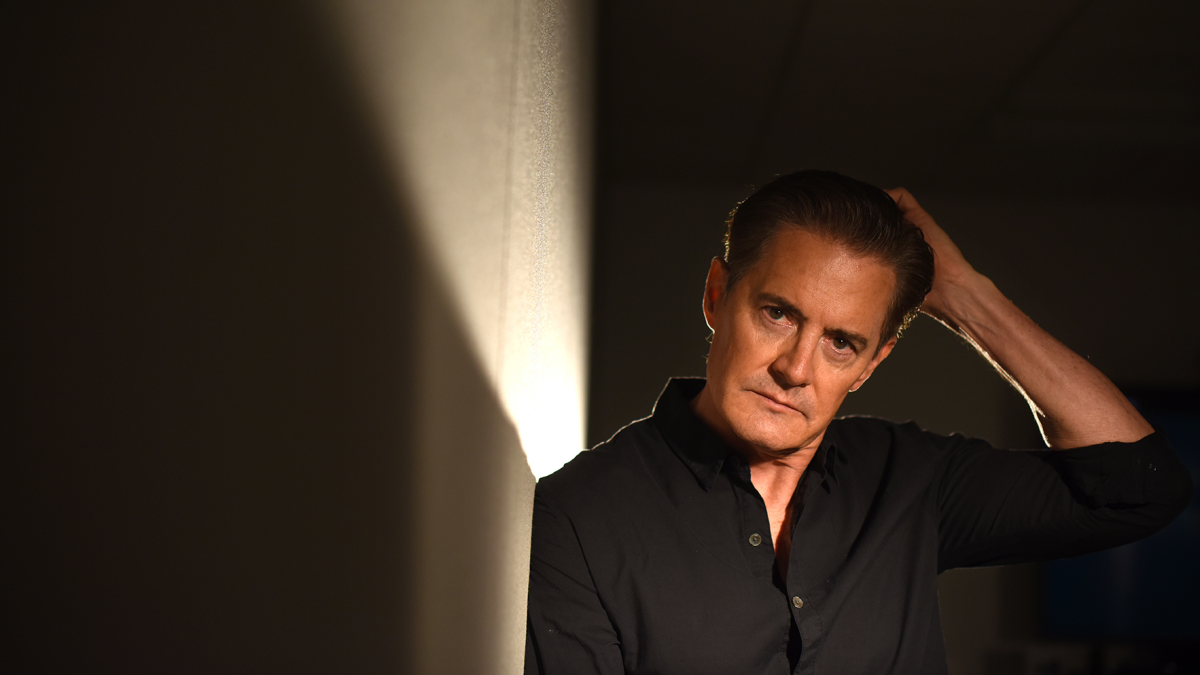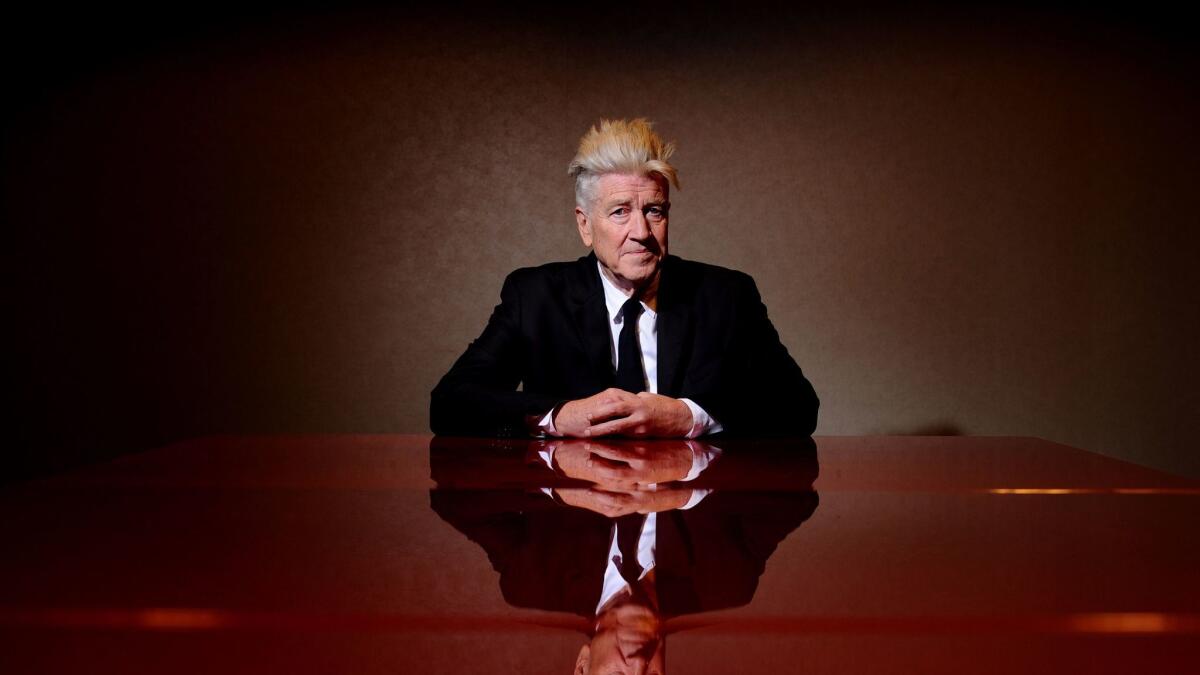Kyle MacLachlan on reviving Agent Cooper for ‘Twin Peaks,’ ‘When David’s there, I’m Cooper’

- Share via
Reporting from New York — For Kyle MacLachlan, it was all about the suit.
More than a quarter of a century since “Twin Peaks” ended its brief but influential run on ABC, the actor is reprising his signature role as FBI Special Agent Dale Cooper, a man whose appreciation of cherry pie and a “damn fine” cup of coffee knows no bounds, in a long-anticipated revival premiering Sunday on Showtime.
MacLachlan has been through quite a lot since the early ’90s, when the mystery of who killed beauty queen Laura Palmer captivated viewers.
The 58-year-old, his hair graying ever so slightly at the temples, has endured wild career swings, gotten married, become a father, and even started a wine business.
Dressed in head-to-toe black, he’s seated in an office at Showtime’s headquarters in midtown. A dozen stories below, city buses bearing sepia-tone images of him as an older, but still dashing, Cooper chug down Broadway
Luckily the suit still fit.
“The suit pretty much sets it for me — my whole being starts to transform,” says MacLachlan, moving his hands as if grasping an invisible pole to suggest Cooper’s ramrod posture. “And also just David’s presence. When David’s there, I’m Cooper.”
That would be David Lynch, who co-created the original series with Mark Frost and co-wrote and directed all 18 episodes — or “parts,” as he prefers to call them — of the revival. Announced with much fanfare in October 2014, the limited series premieres Sunday and is shrouded in a layer of secrecy that makes the NSA look like amateurs. (Even seemingly benign details about Cooper’s suit were deemed too spoiler-y for print.)
The series marks the return of not only one of the most admired cult series in television history but also the creative partnership between Lynch and MacLachlan, whose most recent collaborations were the 1992 prequel film “Twin Peaks: Fire Walk With Me” and a series of “Twin Peaks”-themed Japanese coffee commercials from the same era.
Their relationship dates back to the mid-1980s when MacLachlan, then an unknown actor fresh out of the University of Washington, was plucked from regional-theater obscurity to play the lead in “Dune” (1984), Lynch’s first foray into big-budget Hollywood filmmaking. The adaptation was a notorious commercial and critical failure, but it marked the beginning of a dynamic period of collaboration between the actor and director.
“Blue Velvet” (1986), was the antithesis of “Dune” but a precursor to “Twin Peaks” in its warped view of small-town life and flashes of deadpan humor. MacLachlan starred as Jeffrey Beaumont, a college student whose discovery of a severed ear in the grass leads him on an adventure that plays like “The Hardy Boys” on bad acid.
Cooper was conceived as “a grown-up Jeffrey Beaumont,” says Lynch in a phone interview.
“He’s a magical kind of detective,” explains the director, whose plainspoken quality somehow makes him more inscrutable. “He’s got way more energy than most people. He’s always wide awake and alert and he’s always happy.”
Though Cooper is first introduced a full half-hour into the pilot episode of “Twin Peaks,” he makes an immediate impression, enthusing about the local evergreen trees in the first of many tape-recorded messages to the never-seen Diane.
“That scene very much encapsulated the range of things Kyle can play,” says Showtime President David Nevins. “He’s stalwart and subversive at the same time, which is hard to do.”
MacLachlan still considers the pilot, which he rewatches from time to time, “an extraordinary piece of filmmaking.” It debuted in April 1990 to enormous ratings and ecstatic reviews, with critics praising the singular blend of horror, soapy melodrama and quirky humor. But once the central mystery was resolved, viewers fled. Despite organized protests from fans, ABC canceled the series after 29 episodes, immediately cementing its status as a cult classic.
The part earned MacLachlan two Emmy nominations, a Golden Globe Award and countless free cups of coffee from admirers over the years.
“‘Twin Peaks’ is still the [project] people respond to more than others,” he says, pausing for a beat, “certainly more than ‘The Doors.’” (In case you’d forgotten, he played keyboardist Ray Manzarek in the Oliver Stone film.)
“Twin Peaks” is a surreal puzzle of a show whose influence is evident in shows from “Stranger Things” to “True Detective.”
“Twin Peaks” is a surreal puzzle of a show whose influence is evident in shows from “Stranger Things” to “True Detective.”
Wisely, though, few have attempted to imitate its eccentric yet pure-hearted protagonist. Cooper is, on one level, an old-fashioned Hollywood hero marked by boyish enthusiasm and unflagging moral rectitude, a point driven home in the series pilot when he’s mistakenly called Gary Cooper. This is a character who once proclaimed “I would very much like to make love to a beautiful woman who I had genuine affection for” while lying near death on the ground with a gunshot wound in his stomach.
And yet beneath the clean-cut G-Man exterior beats the heart of an oddball. Cooper relies on dreams and visions as much as physical evidence, communicates with dancing dwarfs from alternate dimensions and is drawn to Eastern spirituality. In the series’ second episode, he famously eliminated suspects by throwing stones at bottles from a distance of 60 feet — a technique inspired by his love of Tibet.
“He seems to be secretly listening to radio waves from the zodiac, through the fillings in his teeth,” wrote critic John Leonard in his New York Magazine review of “Twin Peaks.” “He’s a wonder, a puzzlement, a Boy Scout from Sirius the Dog Star.”
Between bites of a ham sandwich, MacLachlan puts it more simply. “You feel like he’s come through darkness, but he’s been able to keep it in place. It doesn’t drive him.”
The series concluded with one of the most heartbreaking series finales in TV history. After a harrowing journey through the mysterious Black Lodge — a.k.a. that room with the red curtains — Cooper was possessed by the malevolent spirit known as Bob. What’s happened to the agent since then — did he take to murdering young girls, like Bob-possessed Leland Palmer before him? — is easily the biggest question hanging over the revival.
MacLachlan hit a rough patch in the years that followed “Twin Peaks,” epitomized by a Razzie-nominated role in “Showgirls” that involved an unintentionally hilarious pool sex scene. But he eventually found a niche of sorts in parts that, like Agent Cooper, played in tension with his classic good looks. In “Sex and the City,” he portrayed Charlotte’s seemingly perfect first husband, Trey MacDougal, a WASPY cardiologist with deep-seated mommy issues and a pesky case of erectile dysfunction. And there was Orson Hodge, Bree’s lying, philandering, would-be plumber-murdering husband on “Desperate Housewives.”

What he didn’t do was return to work with Lynch, who made films with other dark and handsome types, like Justin Theroux (“Mulholland Drive”). MacLachlan has theories about why. “I’m Cooper for David,” he says. “That’s it. I’m Cooper and I live in Twin Peaks.” (Lynch gently disputes this: “If another role came along that he was right for, I would know it and I would be very happy for him. It just didn’t ever happen.”)
However, the pair did see each other regularly. MacLachlan has a home in the Hollywood Hills, just up the road from Lynch. When in town he’d often “just take the parking brake off the car and roll down the hill” for a cup of coffee — yes, coffee. Their conversations would inevitably turn to “Twin Peaks.”
Lynch would usually dismiss the idea of a revival, even though “it wasn’t ever dead,” he says. “The stories continue in one’s mind.”
Eventually, MacLachlan got an urgent phone call from Lynch: He had something to discuss but couldn’t talk about it on the phone. “I said, ‘I hope it’s nothing health-related,’” MacLachlan recalls.
It was not. In New York, Lynch pitched him the new “Twin Peaks” and asked if he’d be interested in reprising the role of Cooper. “I said, ‘I’ve never not been interested,’” says MacLachlan, who was “seduced by the challenge” of reviving “Twin Peaks.” The series arrives amid a wave of ’90s revivals taking over the small screen, including “Fuller House,” “The X Files” and “Will & Grace.”
But this continuation is not driven by nostalgia, insist those involved. If anything, Lynch, who was less involved in the show’s second, uneven season, seems motivated by a desire to course-correct and return to the vision laid out in the pilot. “In my mind the series drifted away from what I thought of as ‘Twin Peaks,’” he says. “It was tough to watch for me.”
Co-writing and directing 18 hours of television — after more than a decade away from full-time filmmaking — was a feat of stamina for Lynch, who also returns in a supporting role as Cooper’s boss, Gordon Cole. “I was a major stud before I started, and now I can barely walk,” he jokes.
For Showtime’s Nevins, Lynch and Frost’s hands-on involvement was essential. “I was only interested if I knew it was going to be the real thing,” he says. The executive describes the revival as Cooper’s “odyssey back to himself” and an exploration of relevant themes of national identity.
“I find Kyle such a quintessentially all-American actor, and I think that’s what David likes about him. It’s really interesting revisiting this character and this world in a moment in American history where we’re trying to figure out who we are, and what it means to ‘Make America great again.’”
MacLachlan is less inclined to elaborate, but does let it slip that — spoiler alert — his professional chemistry with Lynch returned instantly. “That’s something that came back like that,” MacLachlan says with a snap of his fingers. “We do a great dance together.”
See the most-read stories in Entertainment this hour »
Follow me @MeredithBlake
More to Read
The complete guide to home viewing
Get Screen Gab for everything about the TV shows and streaming movies everyone’s talking about.
You may occasionally receive promotional content from the Los Angeles Times.






